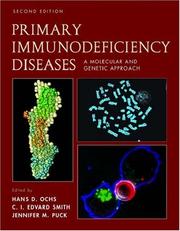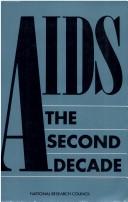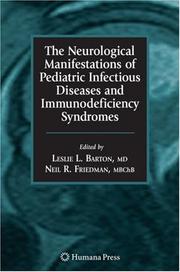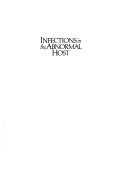| Listing 1 - 10 of 15 | << page >> |
Sort by
|
Book
ISBN: 0124071791 1322215499 0124115543 9780124115545 9780124071797 Year: 2014 Publisher: Oxford, England ; Waltham, Massachusetts : Academic Press,
Abstract | Keywords | Export | Availability | Bookmark
 Loading...
Loading...Choose an application
- Reference Manager
- EndNote
- RefWorks (Direct export to RefWorks)
Primary Immunodeficiency Disorders: A Historic and Scientific Perspective provides a complete historical context that is crucial for students and researchers concerned with primary immunodeficiency. When researchers have a poor understanding of the way we arrived where we are in research, they can miss important points about a disease, or miss out on how to approach new diseases. This historical knowledge of research can assist greatly by showing how it was done in the past, demonstrating the successes and failures, so that it can be done better in the future. This book provides an understanding of the process going from clinical problem to lab and back to the clinic, based on historical experiences. Its chapters proceed from the discovery of the T and B cell lineages through the first BMT for immunodeficiency disorder; lab investigation and gene therapy for PID; the discovery of the gene for AT and its function; understanding cytokine defects; and many other stops along the way. Facilitates communication among physicians and other investigators concerned with immunological and inflammatory diseases Summarizes for the first time all the known facts from 60 years of primary immunodeficiency research, and teaches how an important field in medicine was established Provides stimulating discussions on developing new medical therapies Highlights the importance of studying humans to understand mechanisms of disease that affect humans.
Book
ISBN: 0199348812 019997103X 9780199971039 0195389832 9780195389838 9781306168502 1306168503 Year: 2014 Publisher: Oxford Oxford University Press, USA
Abstract | Keywords | Export | Availability | Bookmark
 Loading...
Loading...Choose an application
- Reference Manager
- EndNote
- RefWorks (Direct export to RefWorks)
Primary immunodeficiency diseases, first recognized 60 years ago, are inherited disorders that affect human adaptive and innate immunity. In most cases, affected individuals experience recurrent infections, but they may also suffer from autoimmune diseases and malignancies. This third edition of Primary Immunodeficiency Diseases provides readers with the historic and scientific background, clinical presentations, immunologic characteristics, and the molecular/genetic underpinnings of this rapidly enlarging class of diseases. With up-to-date diagnostic tools and therapeutic options -- from prop
Book
ISBN: 0128172959 0128167688 9780128172957 9780128167687 Year: 2020 Publisher: London, England : Academic Press,
Abstract | Keywords | Export | Availability | Bookmark
 Loading...
Loading...Choose an application
- Reference Manager
- EndNote
- RefWorks (Direct export to RefWorks)

ISBN: 128056427X 9786610564279 0199747962 1429420456 9780199747962 019514774X 9780195147742 6610564272 9781429420457 0197708374 Year: 2007 Publisher: New York Oxford University Press
Abstract | Keywords | Export | Availability | Bookmark
 Loading...
Loading...Choose an application
- Reference Manager
- EndNote
- RefWorks (Direct export to RefWorks)
This second edition presents discussions of gene identification, mutation detection, and clinical and research applications for over 100 genetic immune disorders. It offers the principles of immunology, genetics, and molecular biology as they pertain to the primary immunodeficiency diseases.

ISBN: 0309042879 9786610212354 1280212357 0309568447 0585010900 9780585010908 030904278X 9780309042789 9780309042871 9780309568449 9781280212352 661021235X Year: 1990 Publisher: Washington, D.C. National Academy Press
Abstract | Keywords | Export | Availability | Bookmark
 Loading...
Loading...Choose an application
- Reference Manager
- EndNote
- RefWorks (Direct export to RefWorks)
Immunology. Immunopathology --- Sociology of health --- Infectious diseases. Communicable diseases --- Klinische psychologie --- AIDS (Disease) --- specifieke problemen --- specifieke problemen. --- Immunological deficiency syndromes. --- Specifieke problemen. --- Immune deficiency syndromes --- Immunodeficiency syndromes --- Immunologic deficiency syndromes --- Immunodeficiency --- Immunologic diseases --- Syndromes --- United States --- AIDS (Disease) - United States.
Book
ISBN: 0124058604 012405546X 9780124058606 9780124055469 Year: 2014 Publisher: London, England : Elsevier,
Abstract | Keywords | Export | Availability | Bookmark
 Loading...
Loading...Choose an application
- Reference Manager
- EndNote
- RefWorks (Direct export to RefWorks)
Stiehm''s Immune Deficiencies focuses on immunodeficiencies in children and adults. This book covers the many advances in the study of immunodeficiency. Stiehm''s Immune Deficiencies includes 62 chapters covering topics such as newly described syndromes, genetic diagnosis, molecular abnormalities, newborn screening, and current therapies. Provides practical guidance to practitioners dealing with the day-to-day issues of diagnosis and management of immune deficient patients Covers both clinical management and scientific advances in one place Includes newly described disorders in various perio
Immunodeficiency. --- Immunologic diseases. --- Immunological deficiency syndromes. --- Immune System Diseases --- Diseases --- Immunologic Deficiency Syndromes --- Immune deficiency syndromes --- Immunodeficiency syndromes --- Immunologic deficiency syndromes --- Immunodeficiency --- Immunologic diseases --- Syndromes --- Immune deficiency --- Immunologic deficiency --- Immunological deficiency --- Immunity --- Immunosuppression --- Immune diseases --- Immune disorders --- Immune system --- Immunologic disorders --- Immunological diseases
Book
ISBN: 1283033798 9786613033796 1555815456 9781555815455 9781555813970 1555813976 9781283033794 6613033790 9781683674092 168367409X Year: 2009 Publisher: Washington, D.C. ASM Press
Abstract | Keywords | Export | Availability | Bookmark
 Loading...
Loading...Choose an application
- Reference Manager
- EndNote
- RefWorks (Direct export to RefWorks)
Over the past twenty-five years, the number of patients with compromised immune systems has grown astronomically. High-risk patients such as these require a unique set of healthcare solutions that take into consideration everything from the etiology and degree of immune suppression to the individual patient's nutritional status. This comprehensive volume examines a wide range of approaches and challenges to infectious disease diagnostics for immunocompromised patients.
Diagnostic microbiology --- Immunological deficiency syndromes --- Opportunistic infections. --- Infection --- Immune deficiency syndromes --- Immunodeficiency syndromes --- Immunologic deficiency syndromes --- Immunodeficiency --- Immunologic diseases --- Syndromes --- Clinical microbiology --- Microbiology, Clinical --- Microbiology, Diagnostic --- Diagnosis, Laboratory --- Medical microbiology --- Communicable diseases --- Pathogenic microorganisms --- Serology --- Technique. --- Diagnosis. --- Diagnosis --- Infections. --- Bacterial Infections. --- Immunocompromised Host. --- Microbiological Techniques. --- Mycoses. --- Virus Diseases. --- Microbiologie clinique --- Syndromes de déficit immunitaire --- Infections opportunistes --- Technique --- Diagnostic
Book
ISBN: 3030571572 3030571564 Year: 2021 Publisher: Cham, Switzerland : Springer,
Abstract | Keywords | Export | Availability | Bookmark
 Loading...
Loading...Choose an application
- Reference Manager
- EndNote
- RefWorks (Direct export to RefWorks)
This book provides a broad clinical overview of primary and secondary immunodeficiencies nested in clinical cases that will help the reader understand the approach to evaluation, diagnosis, and management of these challenging cases. Chapters begin with a comprehensive overview of immunodeficiencies to ground the reader in practical knowledge of the field and these complex conditions. Chapters cover B lymphocyte immunodeficiency, T cell immunodeficiency, immune dysregulation syndromes, and innate immune defects. They discuss a range of treatment options including gene therapy or bone marrow transplant. The book continues with a discussion on secondary immunodeficiencies and their treatment. Each chapter was written by authors with expertise related to different immunodeficiency disorders and provide a succinct overview of pathomechanisms, diagnosis, and treatment of a specific condition. Primary and Secondary Immunodeficiency will be an excellent resource for practicing allergists, hematologists, clinical immunologists, fellows, residents, and other clinicians who work with immunodeficiency patients.
Immunology. --- Rheumatology. --- Infectious diseases. --- Hematology. --- Oncology . --- Primary care (Medicine). --- Infectious Diseases. --- Oncology. --- Primary Care Medicine. --- Primary medical care --- Medical care --- Tumors --- Haematology --- Internal medicine --- Blood --- Connective tissues --- Joints --- Immunobiology --- Life sciences --- Serology --- Diseases --- Immunological deficiency syndromes. --- Immune deficiency syndromes --- Immunodeficiency syndromes --- Immunologic deficiency syndromes --- Immunodeficiency --- Immunologic diseases --- Syndromes

ISBN: 1281314269 9786611314262 1597453919 1588299678 Year: 2008 Publisher: Totowa, NJ : Humana Press : Imprint: Humana,
Abstract | Keywords | Export | Availability | Bookmark
 Loading...
Loading...Choose an application
- Reference Manager
- EndNote
- RefWorks (Direct export to RefWorks)
World Health Organization data documents that infectious diseases and immunodeficiencies are the leading causes of morbidity and mortality in the world's children. In The Neurological Manifestations of Pediatric Infectious Diseases and Immunodeficiency Syndromes, an authoritative, international panel of experts provide a succinct, up-to-date, evidence-based reference to the neurological consequences of infectious diseases and immunodeficiency syndromes in children in one readily accessible volume. Within each of its conveniently structured chapters, readers will find a general description of the disease or disorder, its epidemiology, etiology, clinical synopsis, neurological manifestations, diagnosis, differential diagnosis and therapy. Comprehensive yet concise, The Neurological Manifestations of Pediatric Infectious Diseases and Immunodeficiency Syndromes is an ideal guide for pediatricians, primary care physicians and subspecialists to the complex relationships between infectious diseases, immunodeficiency syndromes and the neurological process.
Communicable diseases in children. --- Neurologic manifestations of general diseases. --- Immunological deficiency syndromes. --- Immune deficiency syndromes --- Immunodeficiency syndromes --- Immunologic deficiency syndromes --- Immunodeficiency --- Immunologic diseases --- Syndromes --- Neurologic symptoms of general diseases --- Neurological manifestations of general diseases --- Nervous system --- Symptoms --- Children --- Infection in children --- Diseases --- Pediatrics. --- Neurology. --- Emerging infectious diseases. --- Immunology. --- Infectious Diseases. --- Immunobiology --- Life sciences --- Serology --- Emerging infections --- New infectious diseases --- Re-emerging infectious diseases --- Reemerging infectious diseases --- Communicable diseases --- Medicine --- Neuropsychiatry --- Paediatrics --- Pediatric medicine --- Health and hygiene --- Neurology . --- Infectious diseases.

ISBN: 0914316184 9780914316183 Year: 1980 Publisher: New York (N.Y.): Yorke medical books
Abstract | Keywords | Export | Availability | Bookmark
 Loading...
Loading...Choose an application
- Reference Manager
- EndNote
- RefWorks (Direct export to RefWorks)
Communicable Diseases. --- Immunity. --- Immunological deficiency syndromes --- Infection --- Infectious diseases --- Diseases --- Medical microbiology --- Immune deficiency syndromes --- Immunodeficiency syndromes --- Immunologic deficiency syndromes --- Immunodeficiency --- Immunologic diseases --- Syndromes --- Disease --- Immunoglobulins --- Infectious Diseases --- Communicable Disease --- Disease, Communicable --- Disease, Infectious --- Diseases, Communicable --- Diseases, Infectious --- Infectious Disease --- Disease Outbreaks --- Disease Transmission, Infectious --- Causes and theories of causation --- immunology --- Communicable Diseases --- Immunity --- Communicable diseases --- Contagion and contagious diseases --- Contagious diseases --- Microbial diseases in human beings --- Zymotic diseases --- Epidemics --- Immune Process --- Immune Response --- Immune Processes --- Immune Responses --- Process, Immune --- Response, Immune
| Listing 1 - 10 of 15 | << page >> |
Sort by
|

 Search
Search Feedback
Feedback About UniCat
About UniCat  Help
Help News
News